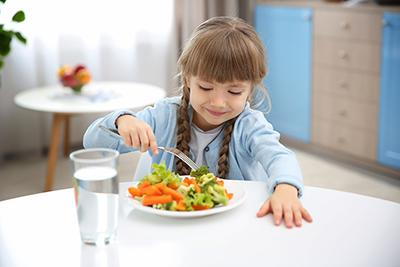
Get the facts on your child’s ideal diet and more.
We know how challenging it can be for kids to get all the nutrients they need from diet alone, especially if your child has food allergies, dietary restrictions or is simply a picky eater. We’ve compiled the top questions about childhood nutrition. If you have questions, your pediatrician can provide additional info and support.
When Can I Start To Introduce Solid Foods Into My Baby’s Diet?
You should begin to incorporate solid foods into your baby’s diet at around 6 months old. By 7-8 months, your child should be eating a lot more solid foods, from veggies and fruits to yogurt, protein and whole grains. Let your child sample one food at a time, which is also the best way to spot any food allergies. Talk with your pediatrician if your child develops a rash or other problems after consuming an allergenic food.
How Much Water Should My Child Consume?
It’s important for everyone to stay hydrated, and that includes children, too. A good rule of thumb is for your child to consume as many eight-ounce glasses of water as their age. For example, if your child is six years old they should consume six eight-ounce glasses of water. Of course, if your child is out in the sun or playing sports it’s important that they consume more water. Fruit juices and sodas are not considered a good alternative for ensuring your child gets enough fluids every day. Water is always the best and healthiest choice.
Is It Okay for My Child To Eat the Same Thing Every Day?
When it comes to your child’s diet it’s best to spice things up and add variety and rotation to daily meals. Sure, there may be some foods that your child just loves more than others, but it’s important that they are getting a good balance and mix of healthy fats, protein, fiber and complex carbs.
I’m Concerned About My Child’s Weight. Now What?
If you are worried about your child’s recent weight gain or that they aren’t eating enough, you should talk with your pediatrician about the best ways to help them manage their weight through proper diet and exercise. We can provide effective solutions and advice for how to tweak your child’s current diet to support their weight gain or loss needs.
These are baseline numbers that may fluctuate based on certain factors, so it’s important to speak with your child’s pediatrician to determine your child’s own dietary needs.
